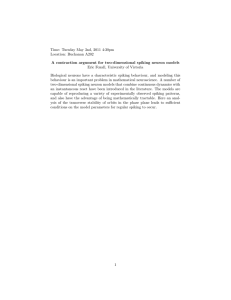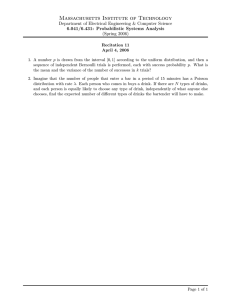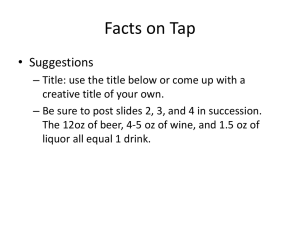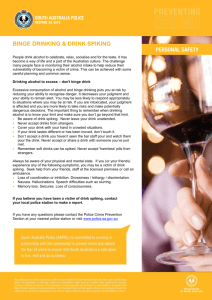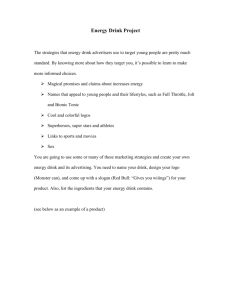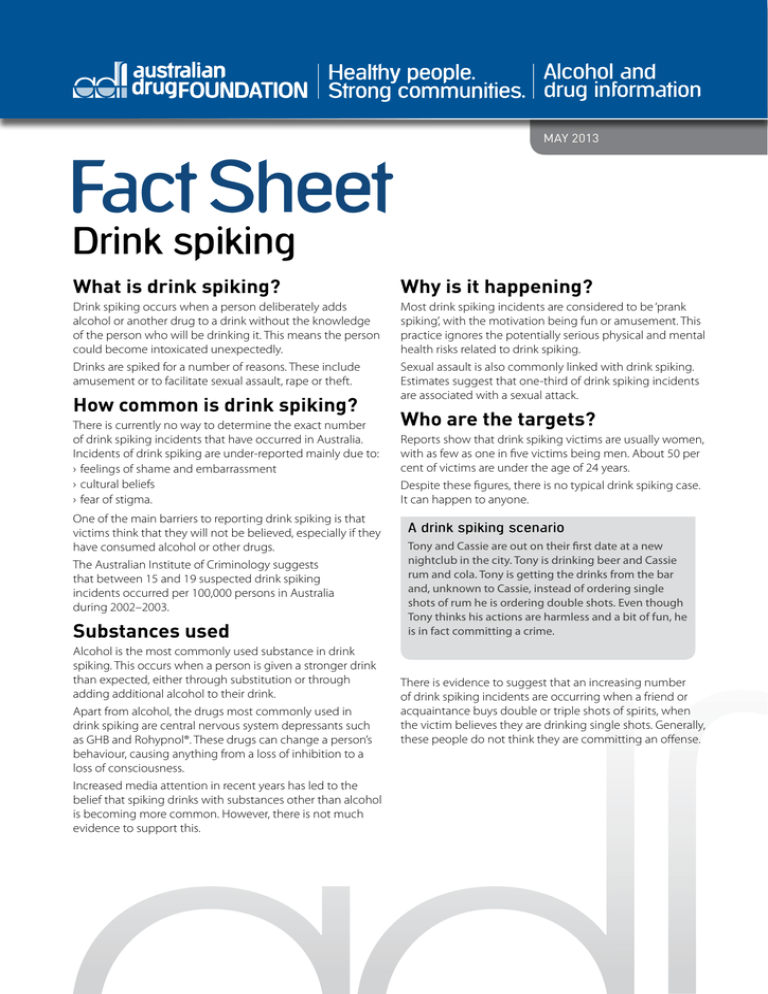
Alcohol and
drug information
Fact Sheet
MAY 2013
Drink spiking
What is drink spiking?
Why is it happening?
Drink spiking occurs when a person deliberately adds
alcohol or another drug to a drink without the knowledge
of the person who will be drinking it. This means the person
could become intoxicated unexpectedly.
Drinks are spiked for a number of reasons. These include
amusement or to facilitate sexual assault, rape or theft.
Most drink spiking incidents are considered to be ‘prank
spiking’, with the motivation being fun or amusement. This
practice ignores the potentially serious physical and mental
health risks related to drink spiking.
Sexual assault is also commonly linked with drink spiking.
Estimates suggest that one-third of drink spiking incidents
are associated with a sexual attack.
How common is drink spiking?
There is currently no way to determine the exact number
of drink spiking incidents that have occurred in Australia.
Incidents of drink spiking are under-reported mainly due to:
›› feelings of shame and embarrassment
›› cultural beliefs
›› fear of stigma.
One of the main barriers to reporting drink spiking is that
victims think that they will not be believed, especially if they
have consumed alcohol or other drugs.
The Australian Institute of Criminology suggests
that between 15 and 19 suspected drink spiking
incidents occurred per 100,000 persons in Australia
during 2002–2003.
Substances used
Alcohol is the most commonly used substance in drink
spiking. This occurs when a person is given a stronger drink
than expected, either through substitution or through
adding additional alcohol to their drink.
Apart from alcohol, the drugs most commonly used in
drink spiking are central nervous system depressants such
as GHB and Rohypnol®. These drugs can change a person’s
behaviour, causing anything from a loss of inhibition to a
loss of consciousness.
Increased media attention in recent years has led to the
belief that spiking drinks with substances other than alcohol
is becoming more common. However, there is not much
evidence to support this.
Who are the targets?
Reports show that drink spiking victims are usually women,
with as few as one in five victims being men. About 50 per
cent of victims are under the age of 24 years.
Despite these figures, there is no typical drink spiking case.
It can happen to anyone.
A drink spiking scenario
Tony and Cassie are out on their first date at a new
nightclub in the city. Tony is drinking beer and Cassie
rum and cola. Tony is getting the drinks from the bar
and, unknown to Cassie, instead of ordering single
shots of rum he is ordering double shots. Even though
Tony thinks his actions are harmless and a bit of fun, he
is in fact committing a crime.
There is evidence to suggest that an increasing number
of drink spiking incidents are occurring when a friend or
acquaintance buys double or triple shots of spirits, when
the victim believes they are drinking single shots. Generally,
these people do not think they are committing an offense.
Fact Sheet: Drink spiking
Is it illegal?
How to avoid drink spiking
Drink spiking is illegal in all Australian states and territories.
Penalties include fines and imprisonment ranging from
two to 25 years.
Victoria recently introduced legislation that makes the spiking
of another person’s food or drink an offence. The offence is
committed even if the food or drink is not consumed or if the
spiking does not harm the person.
›› When out at a pub, club or party, watch your drinks.
›› Avoid sharing drinks.
›› Don’t accept drinks from people you don’t know well or trust.
›› Many people have their drinks spiked by someone they do
know. To avoid this buy or pour your own drinks.
›› Keep an eye on your friends and their drinks.
How will I know if my drink has
been spiked?
If your drink has been spiked you may not be able to see,
smell or taste it. The drug or extra alcohol may be colourless,
odourless and may not affect the taste of your drink.
Warning signs include:
›› feeling dizzy or faint
›› feeling ill or sleepy
›› feeling drunk even if you think you’ve only had
a little alcohol to drink
›› passing out
›› waking up feeling uncomfortable and confused,
with memory blanks about the night before.
What to do if your drink is spiked
›› Ask someone you trust to help you get to a safe place.
›› If you feel unwell or have been sexually assaulted, go to the
emergency department of the nearest hospital.
›› Ask your doctor to test for the presence of drugs. Traces of
certain drugs can be picked up through urine or blood tests
within 24 hours.
Healthy people.
Strong communities.
Further information
Drink spiking is serious: In an emergency,
telephone Triple Zero (000) or the nearest
police station.
For information about sexual assault, or for
counselling or referral, call 1800RESPECT
1800 737 732, Australia’s national sexual
assault, domestic and family violence
counselling service.
druginfo.adf.org.au
1300 85 85 84
druginfo@adf.org.au
These fact sheets
are funded by
Alcohol and drug information
Community programs
Policy and advocacy
Workplace services
Level 12, 607 Bourke Street Melbourne PO Box 818 North Melbourne Victoria Australia 3051
Phone 03 9611 6100 Fax 03 8672 5983 adf@adf.org.au www.adf.org.au ABN 66 057 731 192
Authorised and published by the Australian Drug Foundation, 12/607 Bourke Street, Melbourne, 3000.
© The Australian Drug Foundation, April 2013 ABN 66 057 731 192.
Disclaimer
The Australian Drug Foundation has used its best endeavours to ensure that material contained in this publication was correct at the
time of printing. The Australian Drug Foundation gives no warranty and accepts no responsibility for the accuracy or completeness of
information and reserves the right to make changes without notice at any time in its absolute discretion.

